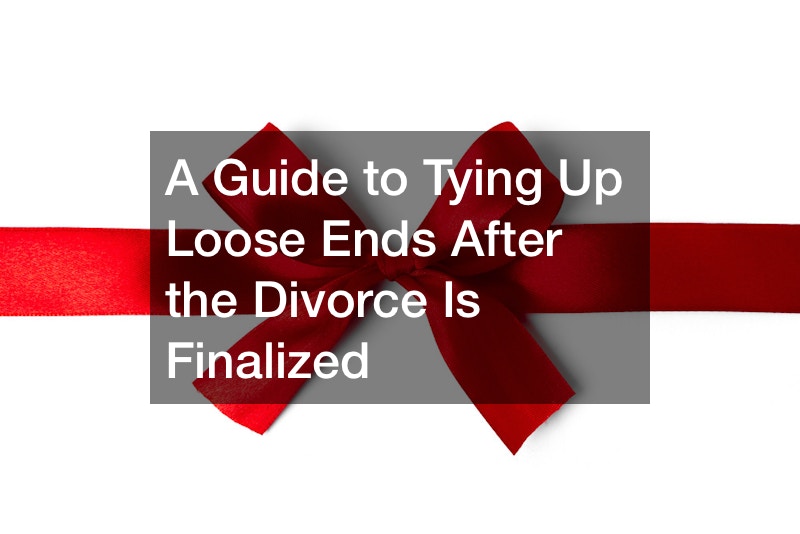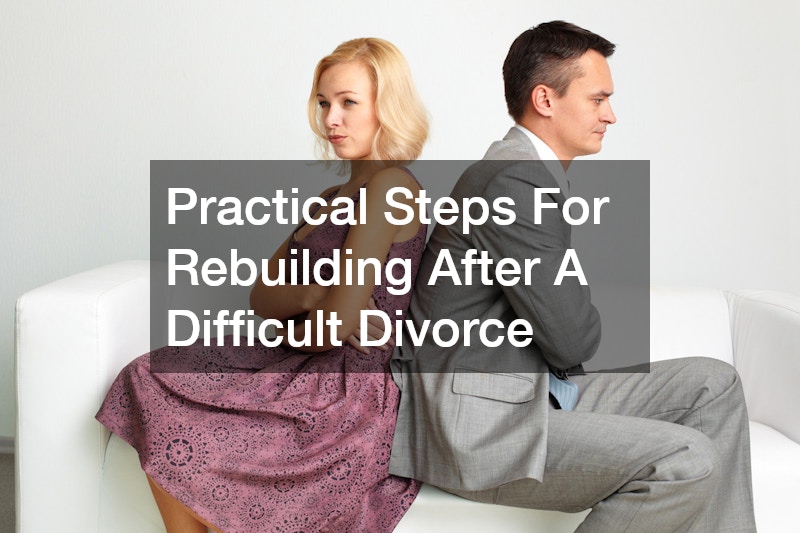
Everyone handles separation or divorce in their own way. The end of a marriage can make a person’s world flip around. Your normal life will no longer exist, which makes it difficult to remain productive. On the plus side, you do have options. There are services available to individuals for individuals that are helping to cope with divorce.
Finding the Right Lawyer

When going through a divorce, finding the right lawyer will make all the difference. Divorce is emotional. The family lawyer you choose needs to be knowledgeable in family law, as well as a good listener.
It doesn’t matter why you need a family law attorney. Whether it’s to negotiate child custody or to mediate divorce proceedings, the family law attorney you hire should be one that you can trust and confide in. Your family law attorney should be someone you feel comfortable confiding information with, even information that may seem embarrassing.
You will most likely need to interview several attorneys who specialize in family law before you find one that fits. You’ll need someone who not only cares about the outcome but also wants the best for you. The right family law attorney will get the case moving and fight for your rights until its finalization.
You need to hire an expert civil litigation attorney. A marriage is a contract, and any time a contract ends, the terms of the dissolution need negotiating. You need an attorney who is not only an excellent negotiator but also comfortable in the courtroom. This is where family law attorneys are most needed: to negotiate (and mediate) the terms you and your spouse have for the termination of your marital contract. The right family law attorney will work hard for you as you find ways of helping to cope with divorce.
Taking the Family Into Account

A divorce involves the entire family, therefore, when considering a legal separation, you must take the entire family into account. Hiring a family lawyer that is able to do this is imperative. Children and extended family members are going to need assistance helping to cope with divorce as well. Therefore, you will need to gently talk to these people (together), beginning with your children.
When you first get married, you think the union lasts forever. You believed the vows you each took, “til death do us part,” would be a reality. However, here you are today, planning how you are going to explain to the kids how you failed. Yet, the end of a marriage shouldn’t be thought of as a failure. It is just a contract that two people were unable to completely fulfill and carry through to the end.
Pick a convenient time when the two of you can sit down with your children and explain the current events. Before spilling the news of the separation or divorce, plan together how you will do this. Your children are going to have a myriad of questions and emotions, such as sadness and guilt. You will need to assure them the divorce is nothing about them or what they did or didn’t do.
By talking to your children together, you will demonstrate to them you are still on a united front, showing them you both care for and love them deeply and always will. Explain that just because the family dynamics have altered, that doesn’t mean the love is not still there. When you talk to your children together, questions about who is “at fault” or a “bad person” will be lessened. This united approach will lower children’s instincts to take sides. In addition, your kids will see the two of you are still working together to cooperate towards a better outcome. Finally, this united approach allows the child to adjust to their new situation more easily.
One way to assist kids with helping to cope with divorce is to talk to your family law attorney. You might want to inquire with them about allowing the children to come to a meeting with you. Perhaps your attorney will be able to answer any questions the two of you cannot.
When Family Matters Get Complicated

Sometimes family matters in a divorce get complicated. When one of these complications is the paternity of the children, you will need a paternity lawyer. Your signature declaring paternity and being listed on the birth certificate is not a guarantee you will be awarded custody. Paternity issues can become complex, overwhelming, and emotional. When this occurs, family law attorneys experienced in paternity issues are needed for helping to cope with divorce issues.
Determining paternity according to the law is rather complex. There are many instances in which the man recognized to be the father of a child is not a biological parent. Below, we explain the various types of “fathers” in the eyes of the law:
- Father by presumption: At the time of conception, this is the man who was married to the mother. He took the legal obligation of paternity toward his wife’s baby and acted as though he was the father.
- Recognized father: This is a man who is not married to the mother but has self-attested to be the father of her child.
- Unmarried father: A man who is not married that gets a woman pregnant.
- Step-father: A man that gets married to a woman who already has a child/children by another man.
The law sets particular obligations for each of these fathers. Hiring a paternity lawyer will help you determine your obligations depending on which kind of father you are. When you hire a paternity lawyer, you will get assistance in establishing paternity and determining visitation rights. Issues such as child support, visitation, and custody are all complications of a divorce that a paternity lawyer helps with. This is one more available service helping to cope with divorce.
Don’t Neglect Your Emotional Health

The five stages of divorce are the same as grief: denial, anger, bargaining, depression, and acceptance. When going through a divorce, it may be the most disrupting process your emotions are subjected to. You will be afflicted with emotions ranging from doubt to relief once you choose to file for divorce. People often compare their emotional health to that of a roller coaster. Many rely on their social community, family, and friends in helping to cope with divorce.
Other emotions or feelings experienced include anxiety, resentment, fear, and confusion. These emotions may rear their head during or after the divorce. Not taking care of your emotional well-being can make them permanent, wreaking havoc on your physical, emotional, and mental health. Even if you initiated the divorce, these feelings can still affect you.
Divorce can leave a person feeling emotionally drained and depressed. If you neglect your emotional health, it can leave you feeling unsatisfied with life. It can even result in health issues after the divorce has been finalized. Not nourishing one’s mental health and well-being can result in you feeling sad, angry, helpless, and lonely. In some cases, you may even start feeling ambivalent about relationships in the future.
There are many factors, both external and internal, that have the potential to harm your mental health during and following a divorce. It can be extremely difficult to manage one’s mental health. It is even more difficult to rehabilitate emotional fortitude or maintain negative emotions. Not taking care of your emotional well-being results in feelings of anxiety, distancing, depression, and distress.
Is Counseling Right for You?

When life throws us lemons, the best option is to “make lemonade,” as the saying goes. However, sometimes issues affecting our emotional and mental health get to be too much, making it difficult to function in our day-to-day lives. When this happens, counseling might be the right option. Better put, anxiety counseling might be right for helping to cope with divorce.
What is anxiety? Anxiety is our body’s way of reacting to something threatening us, whether it is imagined or real. It can be a coping mechanism when life gets excessively tense. It can also give us the motivation we require to make our goals a reality. On the other hand, anxiety can also be bad. Chronic anxiety can result in debilitating, irrational behavior that can interrupt an otherwise productive life. Fear of the unknown is what feeds chronic anxiety and keeps it alive in our psyche. The fear felt when marriage comes to an end, resulting in divorce is something that feeds chronic anxiety. If left untreated, it will affect how we function (or not) in other relationships, work, or school. When chronic anxiety does this, it is advisable to seek professional anxiety counseling for helping to cope with divorce.
Additional Services to Consider

Trying to find ways that aid in helping to cope with divorce is much harder than one might imagine. This section is about some tips to help you cope with a divorce you might not have wanted. The first tip is not to bury your emotions. You will get through it, and one day, learn to live an emotionally healthy life, leading to possibly eventually finding someone new to love.
- Tip #1: Remember to surround yourself with lots of support. If you do this, the pain you feel today will lessen tomorrow, and so on.
- Tip #2: Don’t keep chasing old feelings. Avoid people who remain focused on their pain. Instead, spend time with those who are moving on in positive directions.
- Tip #3: Even if you are sad, spend time in the company of people who are upbeat and positive.
If living in your family home is too depressing, perhaps you should think about moving. If you cannot handle packing away memories right after the divorce, hire a moving company. Rent a personal storage unit to keep these memories stored away until you are able to deal with them. When you are looking for ways of helping to cope with divorce, sometimes you need to be creative. There are many support groups for newly divorced people to get together and talk. Sometimes just talking to someone who is also going through what you are is the best medicine.
How to Effectively Co-Parent Following Divorce

The final step in helping to cope with divorce is learning how to effectively co-parent which includes learning how to trust and work with your former life partner.
There is a bit of good news following the divorce: no matter how bad the divorce was, your children will be alright. Studies prove that 80% of children of divorced parents go on to live life without any adversity. They learn to adapt to their new lifestyle as long as their parents are effective co-parents and get along.
What is co-parenting? This is when parents share joint physical and legal custody, and they work together (in separate households) to raise their kids. Both parents continue to be influential and positive forces to their children. Co-parenting is proven to have an impact on children that is positive for the following reasons:
- Children have the support, love, and guidance of both parents.
- Maintaining a close relationship with both parents gives kids a chance to thrive.
- Allows parents flexibility in sharing their parental duties.
- When fathers share in child-rearing responsibilities, they are more eager and willing to pay support.
This article has given a lot of information about helping to cope with divorce. If you work together with the other parent and keep a positive attitude, everything will eventually be alright.



